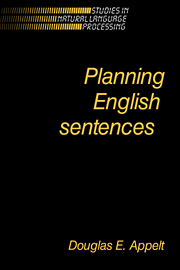Book contents
- Frontmatter
- Contents
- Dedication
- Preface
- 1 Introduction
- 2 An overview of related research
- 3 Representing knowledge about intensional concepts
- 4 Planning to affect an agent's mental state
- 5 Planning illocutionary acts
- 6 Planning surface linguistic acts
- 7 Utterance planning: an example
- 8 Utterance planning: the future
- Notes
- Bibliography
8 - Utterance planning: the future
Published online by Cambridge University Press: 03 December 2009
- Frontmatter
- Contents
- Dedication
- Preface
- 1 Introduction
- 2 An overview of related research
- 3 Representing knowledge about intensional concepts
- 4 Planning to affect an agent's mental state
- 5 Planning illocutionary acts
- 6 Planning surface linguistic acts
- 7 Utterance planning: an example
- 8 Utterance planning: the future
- Notes
- Bibliography
Summary
What has been accomplished
Kamp represents the first step in a very ambitious program of research. It is appropriate at this time to reflect upon this program, how far we have come, and what lies in the future.
KAMP represents not merely an attempt to devise an expedient strategy for getting text out of a computer, but rather embodies an entire theory of communication. The goal of such a theory could be summarized by saying that its objective is to account for how agents manage to intentionally affect the beliefs, desires and intentions of other agents. Developing such a theory requires examining utterances to determine the goals the speakers are attempting to achieve thereby, and in the process explicating the knowledge about their environment, about their audience, and about their language that these speakers must have. Language generation has been ehosen as an ideal vehicle for the study of problems arising from such a theory because it requires one to face the problem of why speakers choose to do the things they do in a way that is not required by language understanding. Theories of language understanding make heavy use of the fact that the speaker is behaving according to a coherent plan. Language generation requires producing such a coherent plan in the first place, and therefore requires uncovering the underlying principles that make such a plan coherent.
- Type
- Chapter
- Information
- Planning English Sentences , pp. 151 - 158Publisher: Cambridge University PressPrint publication year: 1985



